module3 music reading&introduction 课件
- 格式:ppt
- 大小:8.80 MB
- 文档页数:38
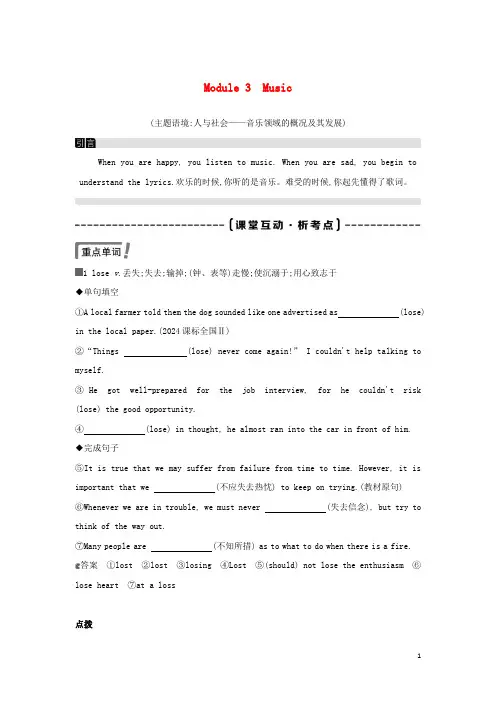
Module 3 Music(主题语境:人与社会——音乐领域的概况及其发展)When you are happy, you listen to music. When you are sad, you begin to understand the lyrics.欢乐的时候,你听的是音乐。
难受的时候,你起先懂得了歌词。
1 lose v.丢失;失去;输掉;(钟、表等)走慢;使沉溺于;用心致志于◆单句填空①A local farmer told them the dog sounded like one advertised as (lose) in the local paper.(2024课标全国Ⅱ)②“Things (lose) never come again!” I couldn't help talking to myself.③He got well-prepared for the job interview, for he couldn't risk (lose) the good opportunity.④(lose) in thought, he almost ran into the car in front of him.◆完成句子⑤It is true that we may suffer from failure from time to time. However, it is important that we (不应失去热忱) to keep on trying.(教材原句)⑥Whenever we are in trouble, we must never (失去信念), but try to think of the way out.⑦Many people are (不知所措) as to what to do when there is a fire.答案①lost ②lost ③losing ④Lost ⑤(should) not lose the enthusiasm ⑥lose heart ⑦at a loss点拨(1)lose face/heart/weight丢面子/灰心/减肥lose one's job/balance/sight/temper/way失业/失衡/失明/发脾气/迷路lose oneself in sth.=be lost in sth.用心致志于某事lose oneself in thought/(be)lost in thought陷入深思be lost for words(特别惊异、困惑等而)不知说什么才好(2)loss n.失去;丢失;损失at a loss困惑;不知所措2 influence vt.&n.影响◆单句填空①If a band is (influence) by another band, do they like them or not?(教材原句)②To test the effect of social influence eating habits, the researchers conducted two experiments.(2024新高考Ⅰ)③It is not their interest but the need of the market that (influence) students' choices of college majors.④The food choices you make the influence of alcohol are generally not very good.⑤Chaplin was not just a genius, and he was among the most (influence) figures in film history.◆完成句子⑥成就感无疑对孩子的早期教化有影响。
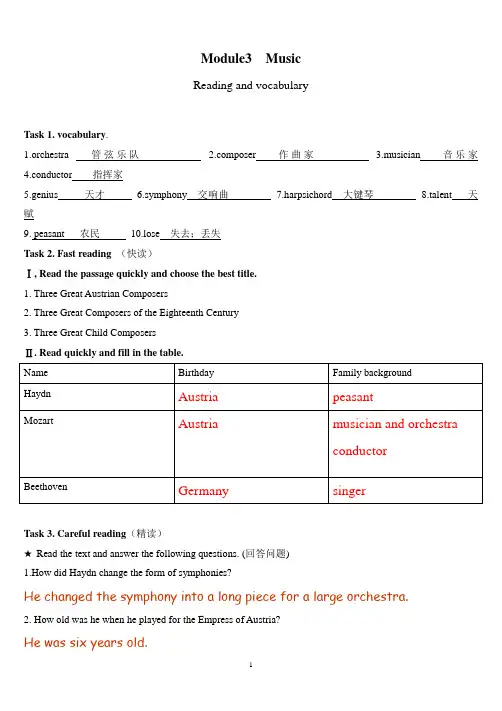
Module3 MusicReading and vocabularyTask 1. vocabulary.1.orchestra 管弦乐队poser 作曲家3.musician 音乐家4.conductor 指挥家5.genius 天才6.symphony 交响曲7.harpsichord 大键琴8.talent 天赋9. peasant 农民10.lose 失去;丢失Task 2. Fast reading(快读)Ⅰ, Read the passage quickly and choose the best title.1. Three Great Austrian Composers2. Three Great Composers of the Eighteenth Century3. Three Great Child ComposersⅡ. Read quickly and fill in the table.Task 3. Careful reading(精读)★ Read the text and answer the following questions. (回答问题)1.How did Haydn change the form of symphonies?He changed the symphony into a long piece for a large orchestra.2. How old was he when he played for the Empress of Austria?He was six years old.3.Did Beethoven stop composing when he became deaf?No, he continued composing when hebecame deaf.★ .Read carefully, and decide if these statements are true (T) or false (F).(判断正误)1. Beethoven is known as “the father of the symphony”. F (Haydn)2. When Mozart was four, he learned to play the piano. F (harpsichord)3. Mozart composed more than 600 pieces of music. T4.Mozart’s father was a peasant. F (Haydn)5. Beethoven’s mother taught him to play the piano. F (father)6. Beethoven continued composing after he went deaf. TTask 4. SummaryTask 5. Group work1. Haydn was born in a village. He is _known as the father of the symphony. He changed the symphony into a long piece for a large orchestra. After_studying music in Vienna, he went to work at the _court____ of a prince in eastern Austria. Thirty years _later_____, he moved to London, _where____ he was very successful.2. Mozart was born in Salzburg, Austria. Though he only lived 35 years, he composed __more than_______ 600 pieces of music. Mozart had musical ___talant__ from a very early age. __By the time_______ he was 14, he had composed many pieces for the harpsichord, piano and violin, _as well as_______ for orchestras.3. Beethoven was born in Bonn, Germany. When he was very young, he learned to play the violin and the piano from his father.In 1791, Beethoven met Haydn, who __met________ Beethoven to move to Vienna. Beethoven became very __popular_____ in Austria, and stayed there for the__rest_ of his life. Even after he became ____completely_____ deaf, he ________ composing.Task 6. HomeworkPlease fill the information of one of your favorites composers and then write a description of him/her. Name:Birth year:Nationality:Occupation:Specialty:Achievements:。
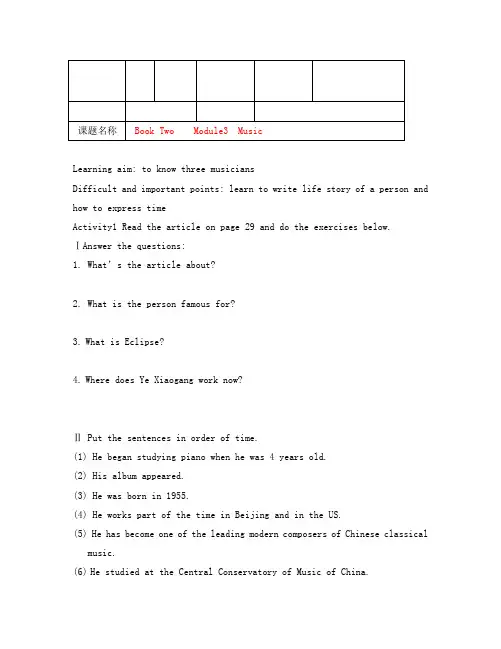
Learning aim: to know three musiciansDifficult and important points: learn to write life story of a person and how to express timeActivity1 Read the article on page 29 and do the exercises below.ⅠAnswer the questions:1. What’s the article about?2. What is the person famous for?3.What is Eclipse?4.Where does Ye Xiaogang work now?Ⅱ Put the sentences in order of time.(1) He began studying piano when he was 4 years old.(2) His album appeared.(3) He was born in 1955.(4) He works part of the time in Beijing and in the US.(5) He has become one of the leading modern composers of Chinese classicalmusic.(6)He studied at the Central Conservatory of Music of China.Ⅲ Translation:1. Ye Xiaogang, who was born in 1955, is one of a group of Chinese composers known as the New Tide.________________________________________________________________________________________________________________________昨天我们参观了一个建于1950年的博物馆。
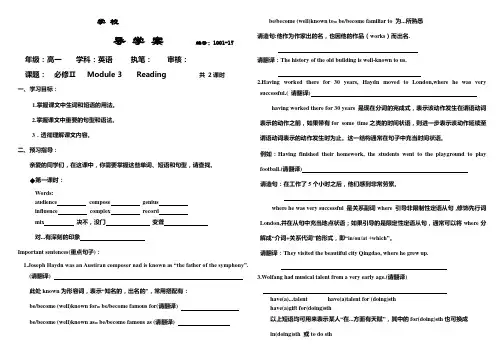
学校导学案编号:1001-17年级:高一学科:英语执笔:审核:课题:必修ⅡModule 3 Reading 共2课时一、学习目标:1.掌握课文中生词和短语的用法。
2.掌握课文中重要的句型和语法。
3.透彻理解课文内容。
二、预习指导:亲爱的同学们,在这课中,你需要掌握这些单词、短语和句型,请查找。
◆第一课时:Words:audience compose geniusinfluence complex recordmix决不,没门变聋对...有深刻的印象Important sentences(重点句子):1.Joseph Haydn was an Austiran composer nad is known as “the father of the symphony”.(请翻译)此处known为形容词,表示“知名的,出名的”,常用搭配有:be/become (well)known for= be/become famous for(请翻译)be/become (well)known as= be/become famous as (请翻译)be/become (well)known to= be/become familiar to 为...所熟悉请造句:他作为作家出的名,也因他的作品(works)而出名.请翻译:The history of the old building is well-known to us.2.Having worked there for 30 years, Haydn moved to London,where he was very successful.( 请翻译)having worked there for 30 years 是现在分词的完成式,表示该动作发生在谓语动词表示的动作之前,如果带有for some time之类的时间状语,则进一步表示该动作延续至谓语动词表示的动作发生时为止。
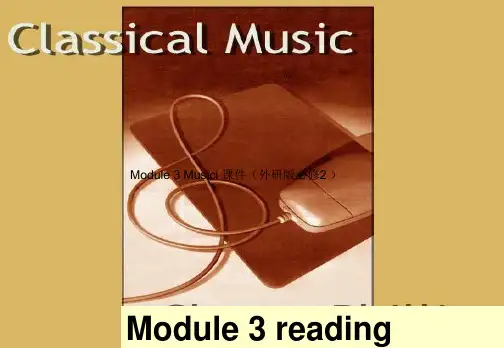
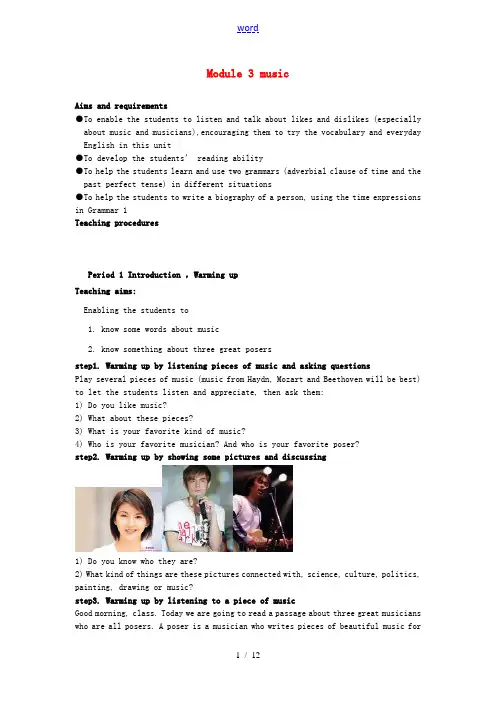
Module 3 musicAims and requirements●To enable the students to listen and talk about likes and dislikes (especially about music and musicians),encouraging them to try the vocabulary and everyday English in this unit●To develop the students’ reading ability●To help the students learn and use two grammars (adverbial clause of time and the past perfect tense) in different situations●To help the students to write a biography of a person, using the time expressions in Grammar 1Teaching proceduresPeriod 1 Introduction ,Warming upTeaching aims:Enabling the students to1. know some words about music2. know something about three great posersstep1. Warming up by listening pieces of music and asking questionsPlay several pieces of music (music from Haydn, Mozart and Beethoven will be best) to let the students listen and appreciate, then ask them:1) Do you like music?2) What about these pieces?3) What is your favorite kind of music?4) Who is your favorite musician? And who is your favorite poser?step2. Warming up by showing some pictures and discussing1) Do you know who they are?2) What kind of things are these pictures connected with, science, culture, politics, painting, drawing or music?step3. Warming up by listening to a piece of musicGood morning, class. Today we are going to read a passage about three great musicians who are all posers. A poser is a musician who writes pieces of beautiful music forothers to sing or to play. Now,let’s listen to a piece of music.(the teacher playsa piece of music ----er quan yingyue)1.do you know what kind of music it is?2.whose work is it?3.what kind of music is it?4.what is your feeling after listening to it?Step 4 show the following picturesAnd make the students familiar with these new words:Piano violin saxphone drum erhu guitarste p4.now please match these musical instruments with their names.Step 5 work in groups to discuss these questions:1.which of the instruments do you like listening to?2.which famous musicians play them?3.is the chinese instruments different from the other instruments?describe thedifference,if there is one.Step6 summary and homework:Today we’ve learnt the Introduction,know something about music,and we’ve also learnt some new words.The homework:1.Try to instruct your favorite musician to your class orally.2.Learn the new words again, using the dictionary if necessaryPeriods 2 Reading and VocabularyTeaching Aims:Train the students' reading ability.Learn some useful words and expressions.Teaching Important Points.Help the students to understand the passage better.Learn and master some important words and phrases in this period.Teaching Difficult Points:How to help the students improve their reading and understand the passage better. Teaching Methods:Fast reading to get the general idea of the text.Careful reading to understand the passage better.Discussion to help the students understand what they've learned better. Teaching procedure.Step 1 Lead --inThe teacher may play a kind of music written by Beethoven.------- What kind of music do you think it?----- Who do you know wrote it ?The teacher may discuss the questions and answer them freely.T: As we know, there are various kinds of music around the world. They all have their own obvious characteristic. And also there were famous posers such as Joseph Haydn, Mozart, and Beethoven. Today we may learn of their life from the text.Step 2 Reading prehension.Fast reading: Read the passage quickly and choose the best title.A.Three Great Austrian posers.B.Three Great poser of the eighteenth Century.C.Three Great Child posers.Key: B.Now let's read the passage again, underline new words in the text and decide whether the following statements are right or not.1.The three posers were all born in Austria.2.Mozart had a beautiful singing voice.3.Mozart died before his fortieth birthday.4.Beethoven once worked at the court of a prince, who began to go deaf when he grew older.5.Beethoven had ever met Haydn, but he didn't think he taught him a lot.6.Both Haydn and Mozart had fathers who were musicians.Key:1.F Beethoven was born in Bonn, Germany.2.F. Haydn had a good singing voice.3.T4.F. Haydn once worked at the court of a prince, but he didn't go deaf.5.T6.F. Haydn was the son of a peasant( The teacher may begin with the T/F questions orally and this is a good time to test their listening abilities as well as their prehension of the text. )Step 3 Read and listen to the passage. Meanwhile, some more questions are waiting for you.1.How did Haydn change the form of symphonies?2.How long did he work in eastern Austria?3.How many pieces of music did Mozart pose?4.How old was he when he played for the Empress of Austria?5.How long were Mozart and Haydn friends?6.Who taught Beethoven how to play the piano?7.Did he stop posing when he became deaf?Keys:1 He changed the symphony into a long piece for a large orchestra.2. 30 years.3.More than 600 pieces of music.4. When he was 6 , he played the harpsichord in a concert for the Empress of Austria.Periods 3, Function and GrammarTeaching aims:1 To learn grammar rules2 To use the grammar rules for correct munication3 To study co-operatelyTeaching important points: To use the correct tense and the proper conj. Teaching difficult points: To use correctly the two tenses and the three conj. Teaching methods: Explanation and practiceTeaching procedure:Step Ⅰby telling the class what happened to the Shenzhou Ⅻlot in the area of.Shenzhou Ⅻand the whole nation were waiting and I came back home fromschool and heard the news, I couldn’t help getting exciteed. I feelproud of our country.Step Ⅱ Grammar 11 Make sentences with “when , while, e in , have a lesson〞( Here is a picture of a classroom and a student ing in)A When he came in, we were having a lesson.B When we were having a lesson, he came in.C While we were having a lesson, he came in.2 Say the meaning of “as〞 in the following sentences.D As he was a child, he studied drawing.E As he grew older, he began to go deaf.F He listened to music as he walked.当…之时随着一边…一边…3Answer the three questions.When we talk about a single event in the past,we use when as in A .When we talk about a period of time in the past,we use when/ while / asas in B C D.We use as to refer to a progressive change as in E F .4Practiceplete the following sentences with “when ,while , as〞(1) ___she was studying at school, she also sang in the school choir.(2) ___he was living in Vienna, he studied music.(3) ___she met bach,she was only 20 years old.(4) ___he grew older, he found it more difficult to pose music(5) ___he was playing in the orchestra, he met his wife.(6) ___he was working in Hollywood, he became ill and died.(7) ___I listened to the violin solo, I fell in love with classical music.(8) ___they toured Europe for 10 years, they finnally decided to live inAustrilia.Step Ⅲ Grammar 2 The past perfect tense1Read the following sentences and summarise rules, paying attention to tenses. Fill in the blanks.After Liping had finished doing his homework, he turned on the TV.After they had got everything ready, they began to do the experiment.Before he came to our school, he had taught English for several years.Before his letter reached me, I had received his telephone call.They had finished the project by last month.I had left the country by the time the letter reached me.had done before diddid after had donehad done by did/past time2 PracticeWorkbook Grammar (2)(3)(4)plete the sentences using the verbs in brackets and the past simple or past perfect tense.Step Ⅳ1 Game Oral practice ,pair work.Ask and answer questions using all kinds of tenses.Example:-- When did you have your breakfast this morning?-- At 6.-- Have you prepared for the English lesson?-- Yes, I have. I have finished the exercises in the workbook.2 Watch a vedio play.Step Ⅴ Sum upAsk some students to make sentences using “when, while, as, before, after, by〞. Step Ⅵ Homework: Present a biography of a famous Chinese musician or poser.Periods 4 Speaking and WritingTeaching Aims:1.Knowledge and Skilla.To develop speaking ability by talking about likes and dislikes.b.To learn about some vocabulary and knowledge related to music and posers.c.To develop writing ability by presenting a biography of a famous Chinesemusician or poser.d.Train the ability of collecting and dealing with information, and developtheir abilities of getting new information, munication and cooperation.2.Emotion and Valuesa.To raise students’ interests in science and form the right attitude towardsall kinds of music.b.To help them know Chinese traditional music well and cultivate their interestin playing some Chinese instrument.3. Character-building:a.To make them know how to enjoy different kinds of music.b.Arouse their interest of playing some kinds of instrument and enrich theirleisure time.4. Cross-cultural awarenessa.To help them know the difference between China and some western countries ininstruments.b.Cultivate their awareness of cultural munication through the speciallanguage—music.Difficulties and Importance:a.To make the students understand and grasp the vocabulary and knowledge relatedto music.b.To enable the students to know how to use adverbial clause of time. Teaching Method:a.Task-based methodologyb.municative ApproachTeaching Procedures:Step 1 Pre-readingLook at the picture and answer the following questions.1.Who is he?2.Have you ever know something about him?Step 2 While-readinga. SkimmingRead the passage quickly, and make a note of some basic information about Ye xiaogang.Suggested answers:b. Detailed readingRead the passage carefully and fill in the blanks with proper words. Find what Ye Xiaogang did or what happened to him in the following years:Suggested answers:Step 3. Post-readingDiscussion.1.Are there any similarities between Ye Xiaogang and the European posers you haveread about in this module?2.Do you think it is a good idea to mix Chinese and western music?Step 4 Everyday Englisha. Listen to two people talking about the way they listen to music and answer the questions.1.How do they listen to it?2.Are they happy with the way they listen to music?3.What does Anna offer to do for Tom?b. work in pairs. Discuss your favourite music and how you listen to it.Step 4 Guided writingWrite a short passage of a famous singer in China—Han Hong.The following words may help you:1. sing well successful song writer2.born in1971 in Tibet(某某)3. young watch her mother sing and dance4. at the age of nine professional(专业的) training in Beijing.5. in 1985 her first national prize6. write songs in 19937. song Hometown number one in ChinaHomework:1.Finish writing the biography of Han Hong—a famous Chinese singer.2.Finish other exercises in this module.Periods 5 culture cornerTeaching aims:Enabling the students to1. to know sth about Ye Xiaogang2. write a biography of a famous Chinese musician or poser.Teaching steps:I. Ask some students to say something about Mozart.Give as many details as possible. II. Try to think of a Chinese musician or poser, eg. Xu Peidong.Gather these materials.1. when, where and in what kind of family he/ she was born.2. how he/ she spent his/ her childhood or youth.3. about his/ her education4. what are his/ her famous works5. what his/ her style is / wasGroup work. Ask the students to discuss about the musician or poser.Then ask some students to stand up to say sth. about the musician or poser.Correct the mistakes if any.III. Cultural Corner.Ye Xiaogang1. Listen to the passage and try to find the answer to this question:When did his album Horizon appear? (in 1986)2. Read the passage thoroughly and make a note of the information about Ye Xiaogang.Name:_________________ Sex: __________________Nationality:_____________ Job:___________________Main achievements: ____________________________________________Style of music: ____________________________What he did or happened to him in the following years:1955: ___________________________________________From 1978 to 1983: ___________________________________________1985: ___________________________________________1986: ___________________________________________1996: ___________________________________________3. Check the answers with the whole class. Then ask one or two students to say sth about Ye Xiaogang with the help of the notes made.4. Language points:1) work as2) leading modern posers 主要作曲家leading article 社论the leading cause 主要原因a leading role 主角3) mix A with B= mix A and B togethermix win with waterNever mix with such people.mix up 弄混,弄错It’s mon to mix him up with his brother.弄乱mix up the papersmix up those data4) receive many prizes5) part ofIV. Homework:Write a short passage about the Chinese musician or poser we talked about this period.。
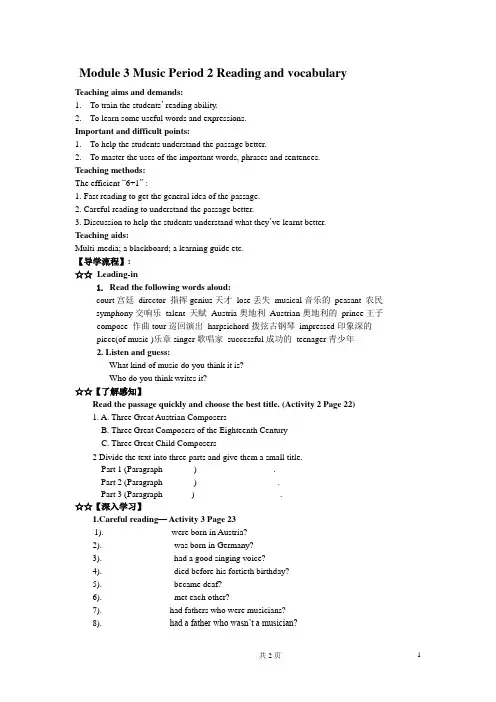
Module 3 Music Period 2 Reading and vocabularyTeaching aims and demands:1.To train the students’ reading ability.2.To learn some useful words and expressions.Important and difficult points:1.To help the students understand the passage better.2.To master the uses of the important words, phrases and sentences.Teaching methods:The efficient “6+1” :1. Fast reading to get the general idea of the passage.2. Careful reading to understand the passage better.3. Discussion to help the students understand what they’ve learnt better.Teaching aids:Multi-media; a blackboard; a learning guide etc.【导学流程】:☆☆Leading-in1. Read the following words aloud:court宫廷director 指挥genius天才lose丢失musical音乐的peasant 农民symphony交响乐talent 天赋Austria奥地利Austrian奥地利的prince王子compose 作曲tour巡回演出harpsichord拨弦古钢琴impressed印象深的piece(of music )乐章singer歌唱家successful成功的teenager青少年2. Listen and guess:What kind of music do you think it is?Who do you think writes it?☆☆【了解感知】Read the passage quickly and choose the best title. (Activity 2 Page 22)1. A. Three Great Austrian ComposersB. Three Great Composers of the Eighteenth CenturyC. Three Great Child Composers2 Divide the text into three parts and give them a small title.Part 1 (Paragraph ___-___) _________________.Part 2 (Paragraph ___-___) __________________.Part 3 (Paragraph___-___) ___________________.☆☆【深入学习】1.Careful reading— Activity 3 Page 231)._______________ were born in Austria?2).________________ was born in Germany?3). ________________had a good singing voice?4). ________________died before his fortieth birthday?5). ________________became deaf?6). ________________met each other?7). _______________had fathers who were musicians?8). _______________had a father who wasn’t a musician?2. Careful reading—filling in the three charts☆☆【迁移运用】Reading expression -Activity 4 on P231.How did Haydn change the form of symphonies? (within 10 words)_____________________2. How long did he work in eastern Austria? (within 2 words)_____________________________3. How many pieces of music did Mozart compose? (within 5 words)_______________________4. How old was he when he played for the Empress of Austria? (one word)___________________5. How long were Mozart and Haydn friends? (within 2 words)____________________________6. Who taught Beethoven how to play the piano? (within 2 words)__________________________7. What happened to him when he grew older? (within 6 words)___________________________。
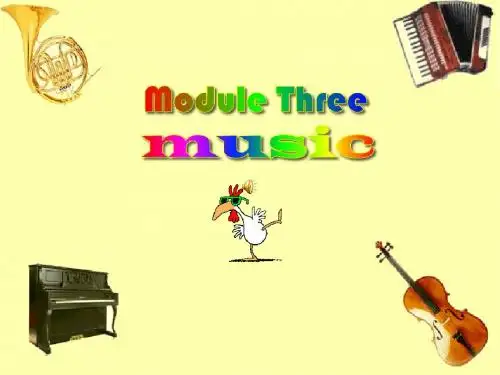

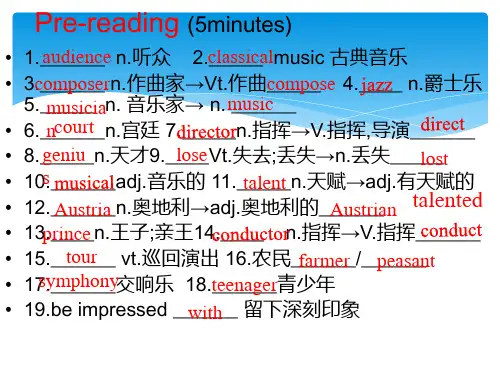
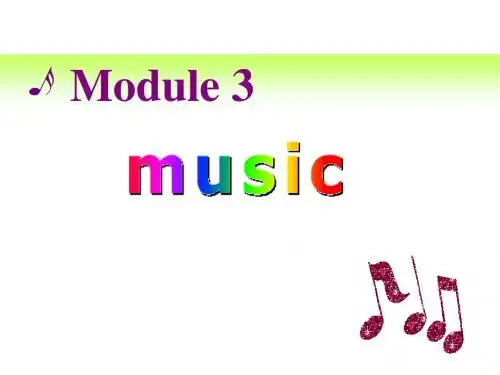
Module 3 Music一、课前基础自查(一)分类记单词——省时高效Ⅰ.阅读单词(知其意)1.choir n.(教堂里的)唱诗班;合唱队2.jazz n. 爵士乐3.orchestra n. 管弦乐队(团)4.saxophone n. 萨克斯管5.court n. 宫廷6.symphony n. 交响乐;交响曲;交响乐团7.Austria n. 奥地利8.Austrian adj. 奥地利的9.prince n. 王子;亲王10.album n. 专辑11.ballad n. 民歌;民谣;(伤感的)情歌12.lyrics n.(复)歌词13.solo adj. 独奏的14.tune n. 曲调15.catchy adj. 动人的16.band n. 乐队Ⅱ.重点单词(写其形)1.audience n. 听众2.tour vt. 巡回演出3.complex adj. 复杂的4.genius_n. 天才5.classical n. 古典音乐6.peasant n. 农民Ⅲ.拓展单词(通其变)1.musician n.音乐家→music n.音乐→musical adj.音乐的2.director n.指挥;导演→direct vt.指挥adj.直接的→direction n.方向3.lose vt.失去;丢失→loss n.失去;丧失;损失→lost adj.迷路的;丢失的4.talent n.天分;天赋;才华→talented adj.有才能的5.influence vt.影响n.影响;作用→influential adj.有影响(力)的6.lecturer n.(大学的)讲师→lecture n.& vt.演讲;报告7.record vt.录音→recorder n.录音机8.compose vt.作曲;创作→composer n.作曲家[语境活用]1.A famous musician played a good piece of music using a musical instrument.(music) 2.Mr Smith is one of the most popular lecturers in our university. He will give us a lecture in the lecture hall tomorrow morning.(lecture)3.There was a police officer directing the traffic, so the lost director came up to him to ask how to get to the local theatre. The policeman showed him the direction and he left. (direct)4.As a composer,_he has composed a great deal of music. (compose)5.The little boy showed his great talent for painting. We all believed he would become a talented artist.(talent)→composition n.作文;作曲9.mix vt.使混合→mixture n.混合物→mixed adj.混合的10.conductor n.指挥→conduct vt.指挥(乐队) 6.She's very good at making friends and influencing people, so she has a great influence on me and I like this influential girl.(influence)(二)练中记短语——记牢用活写准记牢语境活用(选用左栏短语填空)1.make_a_note_of记录2.have_a_talent_for 有……方面的天赋3.be_known_as 作为……而出名4.as_well_as 除……之外;也;还5.be_impressed_with 留下深刻印象6.no_way 没门儿7.go_deaf 变聋8.if_so 如果这样的话9.split_up 分裂;分割10.change_..._into_...把……变成……11.of_all_time 有史以来12.for_the_first_time 第一次1.He was_impressed_with a variety of exciting rides in Disneyland.2.I never forget the experience that I travelled abroadfor_the_first_time in my life.3.I had to make_a_note_of what he said at the meeting in case I would forget it.4.I hope you as_well_as your sister can take part in my birthday party tomorrow.5.The Forbidden City is_known_as one of the largest constructions of wood in the world.6.When he was five, his parents split_up,_which contributed to his unhappy childhood.7.At present, people are changing farmland into wasteland as they have cut so many forests.8.Unfortunately, he went_deaf at the age of 5 because of an illness.9.In a word, shopping online can balance their time, feelings and work. If_so,_online shopping will replace shopping instores in the long run.10.Sally has_a_talent_for creating atmosphere for her students that allows them to communicate freely with each other.(三)仿写明句式——以用为本教材原句句式解读句式仿写1.Having worked there for 30years,Haydn moved toLondon, where he was very successful.在那里工作了30年后,海顿现在分词的完成式作状语。
Module 3 MusicSection Ⅰ Introduction & ReadingPre-readingFolk songs are the songs that are made up by common people. Many folk songs tell about heroes, robbers or young girls. Others, like OldMacDonaldHadaFarm, are just for fun. Some folk songs are about the kinds of work that people do. Christmas carols (圣诞颂歌) are folk songs, and so are the patriotic (爱国的)songs of many countries.Every country has its own folk songs. Most of these songs were made up long ago, and people have been singing them for hundreds of years.Of course, in China, we also have a long and honoured tradition of folk songs and folk singers. Like all folk songs, they come from the ordinary people and tell of things in ordinary lives. There are three main kinds of Chinese folk songs: Hao Zi, Xiao Diao and Shan Ge.Hao Zi is sung by males. Shan Ge is sung by two people,while Xiao Diao, with its beautiful tone, is usually sung by girls.And in this module we’ll learn something interesting and important about some foreign musicians. We’ll be impressed by their special experiences and talent in music. Well, let’s begin.Section_ⅠIntroduction & Reading —Prereading[原文呈现][读文清障]Joseph Haydn(1732-1809)was an Austrian composer①and is known as②“the father of the symphony③”. Other composer s had written symphonies before Haydn, but he changed the symphony into④ a long piece for a large orchestra⑤.He was born in a village in Austria⑥, the son of a peasant⑦. He had a beautiful singing voice⑧. After studying music in Vienna⑨,Haydn went to work at the court○10 of a prince ⑪in eastern Austria, where he became director⑫ of music. Having worked there for 30 years⑬, Haydn moved to London, where he was very successful.Wolfgang Amadeus Mozart (1756-1791) was a composer, possibly the greatest musical genius⑭ of all time⑮. He only lived 35 years and he composed⑯more than 600 pieces of music.Mozart was born in Salzburg, Austria. His father Leopold was a musician⑰ and orchestra conductor⑱. Wolfgang had musical⑲talent⑳from a very early age. He learned to play the harpsichord○21 when he was four, he started composing music when he was five, and when he was six, he played the harpsichord in a concert for the Empress○22 of Austria.By the time he was 14, Mozart had①composer/kəm’pəʊzə/n.作曲家②be known as作为……而著名③symphony/’sImfəni/n.交响乐;交响曲;交响乐团④change ...into ...把……转变成……⑤orchestra/’ɔːkIstrə/n.管弦乐队(团)⑥Austria/’ɒstriə/n.奥地利⑦peasant/’peznt/n.农民the son of a peasant是he的同位语。
Module 3 Music reading学案学习目标:1. Learn something about word-famous composers2. Learn the following important and difficult phrases and sentences in the passage. Phrases: be known as, change… into, a beautiful singing voice, of all time, from a very early age, be impressed with, for the rest of his life, go deaf Sentences:●Having worked there for 30 years, Haydn moved to London, where he was verysuccessful.●By the time he was 14, Mozart had composed many pieces for the harpsichord,piano and violin, as well as for orchestras.●While he was still a teenager, Mozart was already a big star and toured Europegiving concerts.●It was Haydn who encouraged Beethoven to move to Vienna.●As he grew older, he began to go deaf.3. Develop your love for music.学习过程与方法:Task 1: Enjoy a piece of music by Beethoven on PPT.Task 2: Review the words in the box on P22.Task 3: Skimming: Read the passage quickly and choose the best title in Ex 2 on P22. Task 4: Careful reading : Read the passage carefully and fill in the form.About HaydnAbout MozartAbout BeethovenTask 5: Read the passage again and underline important phrases and sentences. And make a mark(作标记) where you can’t understand.Task 6: Share your phrases, sentences and your questions in groups.Task 7:Share your understanding of these phrases and sentences with the whole class.Task 8: Follow your teachers to get a better understanding of the important phrases and sentences on PPT.Task 10: Prediction: read the title of the passage and try to guess what will be talked about.Task11: Scanning: read the passage quickly and summarize the main idea of thepassage.Task12: Careful reading: Read the passage carefully and answer the followingquestions.1.Which composers group does Ye Xiaogang belong to? ( within 5 words)2.When did he begin to study piano? (within 10 words)3.What did he work as after he graduated from the central conservatory ofmusic? (within 5 words)4.What is Ye Xiaogang famous for? (within 15 words)5.Translate the sentence into Chinese.From that time, he has been one of the leading modern composers ofChinese classical music.Task 13: Read the following sentences and try to translate them into Chinese. While:1.Our house must have been broken into while we were asleep.2.While I am poor, I still feel happy every day.3.Tom is very good at Science, while his brother is absolutely hopeless.When:1.I loved history when I was at school.2.I was about to go out when my friend came to visit me.As:1.As she grew older she gained in confidence.2.“ No, I won’t, I’ll be fine, ” said Zhou kai, as he opened the door.巩固练习1.Finish Ex1, Ex2, on p.792.Translation(1)他在看书时,他的妻子一直在烧饭。
Module3 Music假定你是李华,你的美国笔友Peter来信与你交流对音乐的看法以及你喜欢的音乐形式及原因。
请你用英语给他回复一封100词左右的邮件。
DearPeter,Iamverygladtohavethechancetosharemyopinionsaboutmusicandmyfavouritemusicwithyou .Music playsanimportantrole inourlife.Firstly,itcanmakeusfeelrelaxed bothmentallyandph ysically,thus helpingreduceourpressureatstudy.Secondly,itcanexciteandencourageus when everwemeettroubles.What'smore,musiccanhaveacomfortingeffect whenweareworried andhelpu s outoftrouble.Besides,musiccan beofgreathelp onthewaytounderstandingothercultures.Ilikebothpopmusicandtraditionalmusic.Popmusiccanbringmebothexcitementandlovelyt unes.Traditionalmusicbringsmedifferentpleasures.Itcanshowmethepeacefulsideoftheworl dandcaneventellmethetruemeaningoflife.I'mlookingforwardtoyourreply.Yourssincerely,LiHua1.文章体裁:电子邮件。
2.行文逻辑:引出话题→对音乐的看法→喜欢的音乐形式及原因。
课时跟踪练(一) Introduction & Reading—Pre-readingⅠ.阅读理解AThe arts, especially music, should be part of every school’s lessons at every grade level. Students would be much smarter if they had some musical experience.They could improve their classroom skills, like paying attention and followingdirections. People develop all these skills when they learn music. Making music also lets children use their imagination. It provides students with a chance to try out their own ideas.Music not only makes children better students, but also givesthem something positive to do. In a music program, children can bepart of a band instead of joining a gang (团伙).Parents can enjoylistening to their children’s music instead of seeing themglued_to_a computer or TV screen. In a school band, students get to be part of ateam. They can get along well with old friends and make new friends through music.Music builds self-confidence, too. It gives children a sense of achievement and success. Making music is something for them to be proud of, and it lets kids practice performing in front of an audience. Music gives children an opportunity for self-expression, and that helps develop their self-confidence.Once again, music is important because it can make children better students,give them something positive to do, and build their character. That is why musicshould be offered in every single grade in every school.语篇解读:音乐在学生的成长过程中其作用不容忽视,是学校必须设置的一门课程。